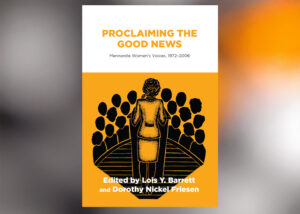Jane Austen once wrote that, for a developing writer, “three or four families in a country village is the very thing to work on.” While Steinbach, Man., is certainly no “country village,” culturally it retains much of its old small-town feel, as so many Bible-belt communities do. Perhaps this is why Steinbach has served local blogger Andrew J. Bergman of “The Daily Bonnet” so well as a source of inspiration and opportunity.
Bergman, 36, says he “grew up culturally Mennonite,” but only began to own his Mennonite identity theologically starting in his 20s. He graduated from university with degrees in English, history and education, and published various short pieces in “traditional” forms, including articles and essays on faith and politics, and even short fiction.
However, his rise to literary celebrity came unexpectedly, he says: “I wrote a satirical post about the Steinbach city council moving the entire city to the Mennonite Heritage Village [a local historic site], in response to some issues that were going on locally, and posted it on my blog. To my surprise the post ‘went viral,’ so to speak.”
That was back in April. Six weeks later, Bergman took a chance and launched “The Daily Bonnet,” a website dedicated to local/“Mennonite” satire. Why “Mennonite” humour?
It’s “just natural,” he says. “It’s the tradition I’m a part of. I know the Mennonite church quite well, so the ideas for satire come easily.”
Still, at that time Bergman says he had no idea whether “The Daily Bonnet” would catch on. But less than three months later, the website (dailybonnet.com) has well over 650,000 views and Bergman’s articles have been read in nearly every country around the world. He calls the response “shocking.”
What is it about “The Daily Bonnet” that people around the world have found appealing? Is it simply the good humour? The cultural novelty? Or is this a case of satire succeeding at a time when other forms have failed to move globally relevant conversations ahead?
A quick look at recent “Daily Bonnet” headlines reveals that Bergman’s writing is not all buggies and rollkuchen:
- “Justin Trudeau confuses yerba mate for marijuana”
- “New survey suggests 8 out of 10 people cannot identify the man in the Rio statue”
- “Man caught with John Howard Yoder books under his mattress”
“Satire can communicate to people in ways that straight information or editorial cannot,” Bergman observes. “You can say things with humour that people might feel uncomfortable with if said directly. I think that examining the church through satire enables us to question what is and isn’t important. There are many great things about the Mennonite church, but there are also plenty of problematic aspects. My hope is that if these areas are exposed to satire they will be made to seem ‘ridiculous,’ and perhaps eventually we will be rid of them.”
If trial by ridicule sounds too harsh to be Christian, Bergman begs to differ. “There is a long history of satire within the Christian church, most notably the great Jonathan Swift,” he says. “Swift’s satire—particularly ‘A Modest Proposal,’ in which he suggested that the rich, since they are treating the poor like animals anyway, should eat infants—was much harsher and more biting than mine usually is, but I appreciate that, as a Christian minister, he was unafraid to deal with the issues. He could have just preached a sermon on being generous, but the satire was much more effective. He’s an inspiration for me.”
As Swift himself knew, the cardinal rule of satire is, “Don’t dish what you can’t take.” Bergman describes the challenges of writing material that is both inevitably personal and explicitly intended not to be taken literally: “Some of my satire is just for fun, while other pieces have a social or political statement. But every reader reads the post in their own way, and even when I am sending a message, the message conveyed is not always what I intended. I suppose that’s inevitable.
“Still, I would never want anyone to feel their religious position was being attacked. If anything, I’m attacking my own beliefs and ideas when I write. It’s a public way of figuring things out for myself: What do I believe? What is important? What is the role of the church, and my role in it? . . . Even when it doesn’t look like it, my writing for ‘The Daily Bonnet’ is often very personal.”
In the end, Bergman says the important thing is not that people agree with his messages, or even understand them, but, rather, that important topics—no matter how sensitive—stay open for honest discussion: “Sometimes it’s good enough that people are talking about the issues.”
More on Mennonites and humour:
More than just punchlines
Being Mennonite 101
The 100 percent clean comedian
Laughter is sacred space
Humour and insight—the legacy of a gifted communicator
Go to The Daily Bonnet.








Leave a Reply
You must be logged in to post a comment.